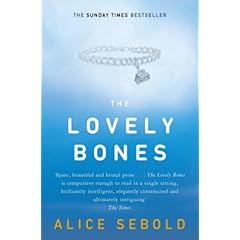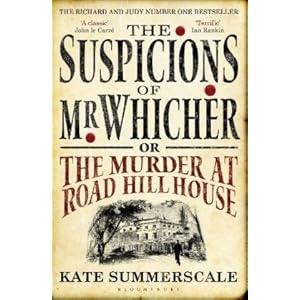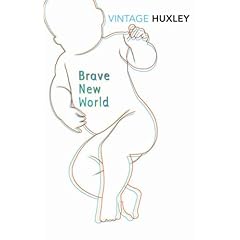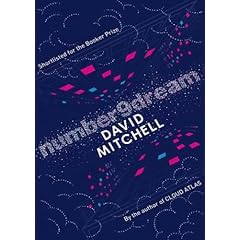 So far, this year, I’ve read two books that can only be described as ‘coming of age’ books. This year, I’ve read two books based in Tokyo, where the protagonist comes from some small village in Japan, and have come to Tokyo with a purpose. This year, I’ve read two books that have the title of a Beatles song (well, one of them has a title from a Lennon song). And both books have been written by different authors! (The other book was David Mitchell’s Number9Dream. Mitchell’s oftened been likened to Murakami, so...)
So far, this year, I’ve read two books that can only be described as ‘coming of age’ books. This year, I’ve read two books based in Tokyo, where the protagonist comes from some small village in Japan, and have come to Tokyo with a purpose. This year, I’ve read two books that have the title of a Beatles song (well, one of them has a title from a Lennon song). And both books have been written by different authors! (The other book was David Mitchell’s Number9Dream. Mitchell’s oftened been likened to Murakami, so...)
As the plane touches down in Germany, an instrumental version of the Beatles’ Norwegian Wood comes on, which results in the protagonist, forty year old Watanabe, reflecting on his college days in Tokyo in 1968, and his two great loves. The book’s title, inspired by the Beatles song, pretty much sums up the story:
I once had a girl, or should I say, she once had me...
The two great loves: Naoko, the girl who used to go out with his best friend from high school, Kizuki, who killed himself when he was seventeen; and Midori: the impulsive, slightly twisted girl, who delights in talking about sex and wearing short skirts.
After Kizuki’s untimely and sad death, Naoko and Watanabe lose touch, until they bump into each other on a crowded train. They attempt to revive their friendship, and while they don’t talk much about the only common factor, they start going for long walks and its mostly Naoko that does the talking, and the protagonist that listens. On her twentieth birthday, the two of them end up sleeping together, after which Naoko troubled by emotions and vulnerability admits herself in a sanitarium far away from civilization.
While she’s in the sanitarium, the vivacious Midori befriends Watanabe, and they end up spending a fair bit of time together, talking about life and things. Midori’s a less emotional, more practical girl, who speaks openly about things most other girls would consider taboo (this is highlighted by the fact that Watanabe is surprised about how open she is, specially when she asks him to take her to a pornographic movie). As their friendship grows, so much so that they spend almost every Sunday together, and Watanabe even spends some time taking care of her father in a hospital while she takes some time off for herself. However, while she’s open and shares the details of her life with him, he’s still not told her the truth about where Naoko is, and why they barely spend time together, leading her to believe that she’s a married woman.
In the mean time, Watanabe visits Naoko in the sanitarium, meets Reiko (Naoko’s roommate) and is pleased to find that Naoko is doing better, and he promises to wait for her, ‘til she’s ready to return. He even asks her to move in with him, when he rents a flat in Tokyo. While he visits her, the three of them (Reiko, Naoko and Watanabe) sing songs, with Reiko playing the guitar. The songs they sing include Norwegian Wood (obviously), Michelle, Nowhere Man, Julia, Lemon Tree, 500 miles, and other classics.
That’s who Watanabe is, to both girls: the savior; someone who’s always there, with a shoulder to cry on and a sympathetic ear; someone who is intelligent, and caring. He tries to amuse them with funny stories about his dorm mates, when they look like they need cheering, takes them to porn movies when they want to see one(!), goes to the ‘facility’ a couple of times to visit Naoko, and writes to her every weekend. He even relates the story of Reiko, and how she ended up where she was, after she feels at ease with him and talks to him. In fact, she says that he’s one of those people who’s good, and can save someone from their monsters. However, at this point, I am compelled to say that while some critics have said his character is close to Holden Caulfield’s, I beg to differ. For starters, Caulfield was the one who needed saving in that book, he wasn’t the savior. While Murakami’s tried hard to stress on the fact that Watanabe ‘talks funny’, it’s not “Caulfield”-esque.
This is a sad book, reverberating of death, suicide, losing people and trying to move on. It almost seems like a reprise of Norwegian Wood, which is haunting, and melancholy (and when I awoke, I was alone, this bird had flown). Another property of this book is that it’s full of sex. Unusually so - casual sex, with Watanabe and one of his dorm mates going out to pick up girls for one-night stands regularly, despite Watanabe having Naoko, and his friend a girlfriend. Sex and love are distanced, and at occasions, the author seems to resort to the ‘sex seems like the most appropriate thing at this point’ cliche. At some times, it genuinely surprised me (wouldn’t want to ruin it for you), as did the detail and the emphasis on it. There is also a lesbian scene, detailed, between a married thirty year old woman and her thirteen year old student. It begs the question: Was sex in the 1968-70 Tokyo, in the midst of civil unrest as the students called for a revolution really that casual and indifferent?
This is the first book I’ve read by Murakami, and while I have mixed feelings about it, there is something about the book that makes me want to read more by the author. I can’t quite put a finger on it - whether it’s the simplicity, the beautiful writing, some great music references (from Bach to Beatles to Rolling Stones), or some great literature references (F Scott Fitzgerald, Thomas Mann etc). The characters are interesting, and while I found Naoko slightly annoying (although, to be fair, her character’s witnessed the suicide of her older sister and her high school sweetheart, both of whom had apparently perfect lives), Watanabe a little too goody-two-shoes and Midori half-crazy, at some point or the other, I could relate to and sympathize with all the characters.
Overall, a 7 on 10, and more Murakami on my reading list.
 Pamuk’s The White Castle won the Nobel Prize for literature in 2006, and after reading this book, it is not difficult to figure out why. The Turkish author offers immense insight into the life, philosophies and the psychology of the Hoja (master or teacher) and his slave - a young Italian intellect who was captured by the pirates, and auctioned on the Istanbul slave market. in the 17th century.
Pamuk’s The White Castle won the Nobel Prize for literature in 2006, and after reading this book, it is not difficult to figure out why. The Turkish author offers immense insight into the life, philosophies and the psychology of the Hoja (master or teacher) and his slave - a young Italian intellect who was captured by the pirates, and auctioned on the Istanbul slave market. in the 17th century. You know how it is - People recommend a book to you, you read the gist at the back, it looks interesting, you buy it, you live to regret it. That pretty much sums up Vonnegut’s Breakfast of Champions, for me. I read the first 50 pages, and attributed the dullness to the book kicking off slowly. Read the next fifty, and figured, it’s bound to get better. The next fifty was even more painstaking, and by the time I hit the 200th page, I figured this book was as pointless as it gets.
You know how it is - People recommend a book to you, you read the gist at the back, it looks interesting, you buy it, you live to regret it. That pretty much sums up Vonnegut’s Breakfast of Champions, for me. I read the first 50 pages, and attributed the dullness to the book kicking off slowly. Read the next fifty, and figured, it’s bound to get better. The next fifty was even more painstaking, and by the time I hit the 200th page, I figured this book was as pointless as it gets. This book is not in the same league as A Fine Balance, or even, for that matter, Family Matters. However, the more I think about this book, the more I appreciate it. Mistry has this amazing knack of bringing to life a realistic Indian society, and how they handle various crises and catastrophes that life brings in its wake.
This book is not in the same league as A Fine Balance, or even, for that matter, Family Matters. However, the more I think about this book, the more I appreciate it. Mistry has this amazing knack of bringing to life a realistic Indian society, and how they handle various crises and catastrophes that life brings in its wake. This is Sebold’s debut novel, and while there’s lots of loopholes in the story, the premise in itself is interesting.
This is Sebold’s debut novel, and while there’s lots of loopholes in the story, the premise in itself is interesting. A book with so much potential, and a book I struggled to finish... I just finished it because I hate leaving books half-read.
A book with so much potential, and a book I struggled to finish... I just finished it because I hate leaving books half-read. I bought this book very hesitantly. I’m wary of bestsellers, and the way everyone was bigging this up, I was sure this would be a repeat of The Da Vinci Code or The Kite Runner - two books everyone I know loved, but I could barely get through them. For once, I was pleasantly surprised.
I bought this book very hesitantly. I’m wary of bestsellers, and the way everyone was bigging this up, I was sure this would be a repeat of The Da Vinci Code or The Kite Runner - two books everyone I know loved, but I could barely get through them. For once, I was pleasantly surprised. I saw this book in a WH Smith in Euston, and bought it immediately, being a huge fan of Mary Higgins Clark. Why, and how is this relevant, you ask? Well, because I normally don’t buy books from WH Smith, let alone the ones in Euston, where the queues are so long that by the time it’s my turn probably three of my trains have come and gone. However, the prospect of reading a new suspense thriller was enough to convince me that the wait in the queue would be for the greater good.
I saw this book in a WH Smith in Euston, and bought it immediately, being a huge fan of Mary Higgins Clark. Why, and how is this relevant, you ask? Well, because I normally don’t buy books from WH Smith, let alone the ones in Euston, where the queues are so long that by the time it’s my turn probably three of my trains have come and gone. However, the prospect of reading a new suspense thriller was enough to convince me that the wait in the queue would be for the greater good. A book set in the future, but has a title inspired by Shakepeare’s The Tempest, Brave New World details a dystopian society. However, if you’re expecting to see shades of Orwell’s 1984, you’re in for a surprise. On the other hand, there are some small comparisons that can be made with Bradbury’s Fahrenheit 451, another dystopian world, where literature is banned. Of course, this is where the similarity ends.
A book set in the future, but has a title inspired by Shakepeare’s The Tempest, Brave New World details a dystopian society. However, if you’re expecting to see shades of Orwell’s 1984, you’re in for a surprise. On the other hand, there are some small comparisons that can be made with Bradbury’s Fahrenheit 451, another dystopian world, where literature is banned. Of course, this is where the similarity ends. Although really difficult to read at times, as the book continuously drifts between fantasy and reality, this book was thoroughly enjoyable. While it’s the first book I’ve read by Mitchell, it definitely won’t be the last.
Although really difficult to read at times, as the book continuously drifts between fantasy and reality, this book was thoroughly enjoyable. While it’s the first book I’ve read by Mitchell, it definitely won’t be the last. You have to love the name of the book. That was reason enough to pick it up! Androids, and electric sheep. What could possibly make more sense? Seriously, the name of the book intrigued me enough to pick it up, just to see how bizarre sci-fi could get. It’s not as bizarre as it sounds, if it helps...
You have to love the name of the book. That was reason enough to pick it up! Androids, and electric sheep. What could possibly make more sense? Seriously, the name of the book intrigued me enough to pick it up, just to see how bizarre sci-fi could get. It’s not as bizarre as it sounds, if it helps... A young boy, with the help of a prison guard, escapes from a concentration camp and tries to find his way to Denmark. David is convinced that there is some kind of catch, and there will be people waiting to catch him, punish him and throw him back in the camp, at every point during the initial stages of the escape. Only then does he start believing he can actually escape, and leave the horrors of the concentration camp far behind.
A young boy, with the help of a prison guard, escapes from a concentration camp and tries to find his way to Denmark. David is convinced that there is some kind of catch, and there will be people waiting to catch him, punish him and throw him back in the camp, at every point during the initial stages of the escape. Only then does he start believing he can actually escape, and leave the horrors of the concentration camp far behind.